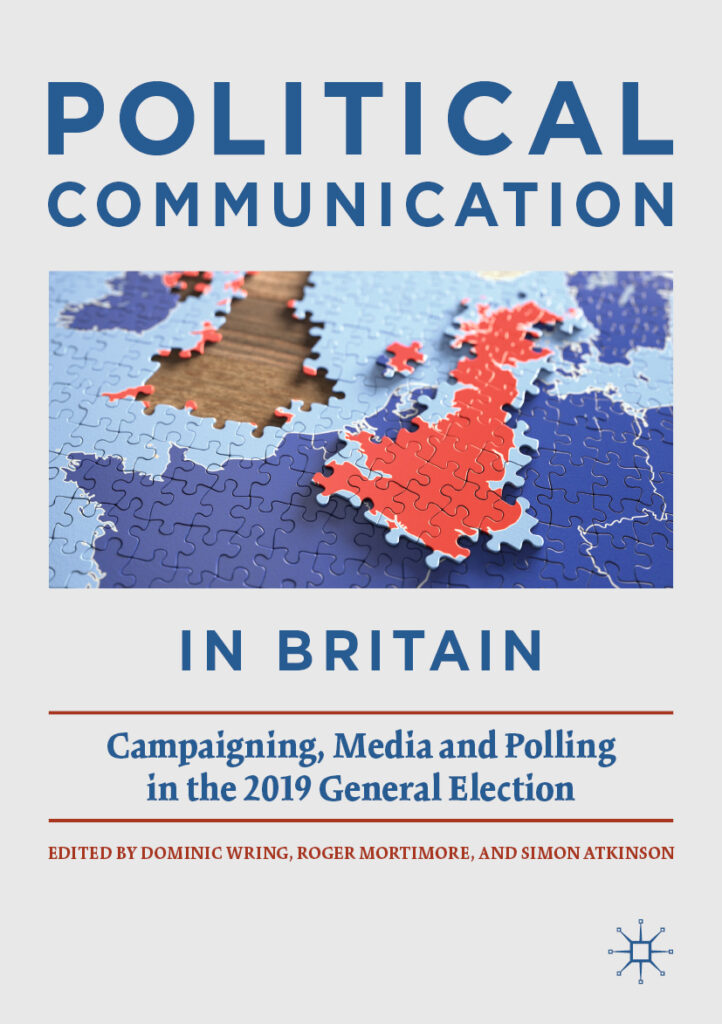New book and online book launch: Charting the evolution of political communication over the last four decades

Dominic Wring, Roger Mortimore and Simon Atkinson (eds.) Political Communication in Britain: Campaigning, Media & Polling in the 2019 General Election (Palgrave) ISBN 9783030814052
Online launch event 1300-1400 Monday 13th December
To coincide with the second anniversary of the 2019 General Election, the Political Communication in Britain editorial team invite you to the launch event for the latest edition of their long-running series. The book provides eye-witness accounts from politicians, journalists, pollsters, and commentators who were involved in all aspects of the campaign. Speakers include John Curtice (University of Strathclyde), Sonia-Delesalle-Stolper (Liberation) and Isla Glaister (Sky News). You can find more information, and register to join the launch, here.
Political Communication in Britain analyses the 2019 election through expert contributions from both practitioners and academics. Co-edited by the CRCC’s Dominic Wring, the book is the eleventh in a series of electoral post-mortems, one of which has appeared after every UK General Election since 1979. The inaugural Political Communications was the first volume to offer insights from strategists belonging to the different parties alongside some of those responsible for reporting the campaign. That book also featured chapters by pollsters and scholars, analysing what is now widely regarded as one of the most important elections, given it resulted in the first of four consecutive Conservative victories and a decisive shift in British politics with the arrival of Margaret Thatcher in Downing Street. The Tory victory in 1979, like the one forty years later, marked the end of an extraordinary period of political drama. Both elections had followed parliaments in which minority governments had attempted to maintain some semblance of authority in the House of Commons and beyond. In less fraught circumstances the respective Prime Ministers involved might have been able to continue to govern, but the respective crises were so serious that MPs ultimately agreed the best course of action would be go to the country. The UK’s relationship with the then European Economic Community was a relatively marginal concern in 1979, given the election was a few years on from the first historic referendum in 1975 to confirm British membership. By 2019, following the further national vote of 2016, the issue had become the single most prominent topic of debate. When Boris Johnson took a calculated risk by pressing for the General Election having only become Prime Minister a few months before, he would make ‘Getting Brexit Done’ his mission and core campaign slogan. Regardless of the merits of the policy, it was one that was readily understandable to a public now conversant with this issue. This book explores this central aspect of the 2019 election and how the opposition parties tried to alter the campaign narrative. The volume, like its predecessors, also considers how the media reported and pollsters analysed the election. The full contents of the book are below.
INTRODUCTION
Background to the Campaign: From Confidence and Supply to the Oven Ready Deal
Dominic Wring, Roger Mortimore and Simon Atkinson
A Brexit Election?
John Curtice
CAMPAIGNING
Reaching the Right People: the Conservatives
Lord Hayward
No Time for Real Change: Labour
Rory MacQueen
‘Time to Choose Our Future’: the SNP
Erik Geddes
An Alternative Voice: the Liberal Democrats
James Gurling
‘Me and Brexit, or Nothing’: a French perspective on Boris Johnson’s victory
Sonia Delesalle-Stolper
‘Water Dripping on a Stone’: Topham Guerin and the Tory digital strategy
Nathan Ritchie
“Strategic lying”: or how the Conservatives dominated the campaign news agenda
Ivor Gaber and Caroline Hughes
MEDIA
Knocking Copy: How the Press Covered the Campaign
David Deacon, David Smith and Dominic Wring
Reporting the Digital Campaign: Online News coverage of the 2019 UK General Election by Buzzfeed and The Huffington Post
Emily Harmer and Rosalynd Southern
The Role of Alternative Media in the 2019 General Election
Declan McDowell-Naylor, Stephen Cushion and Richard Thomas
Consternation Bias: debates, TV inquisitions and impartiality in a changing electoral era
Ric Bailey
Path to Power: The Brexit Election
Isla Glaister
Of Empty Chairs and Ice Sculptures: Regulating broadcasting during the 2019 General Election – The Ofcom perspective
Adam Baxter
POLLING
Understanding the Vote and the Voters: Ipsos MORI’s polling in 2019
Ben Page and Cameron Garrett
The Other Election ‘Winners’: Polling and the Pollsters
Roger Mortimore
Social Media and the UK General Election 2019
Tara Beard-Knowland
Exit Polling: a brief history
Nick Moon
From Media to Social Media: opinion polling in the current context
Anthony Wells
Is the Conservative Lead Growing? Is a Hung Parliament Possible? What Can We Believe? How a Partisan Press Reported the Polls
Murray Goot